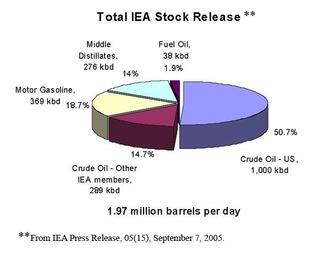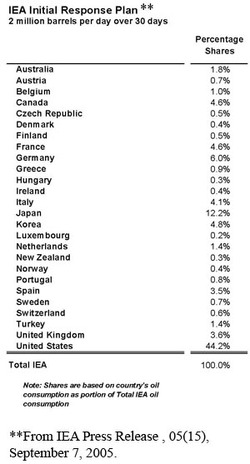The International Energy Agency Responds to Oil Supplies Disruptions Caused by Hurricane Katrina
On 2 September 2024 the International Energy Agency announced that all Member States will take "collective action" in response to the interruption of oil supplies caused by Hurricane Katrina in the Gulf of Mexico. International Energy Agency member countries will make available 2 million barrels per day (2 mb/d) for an initial period of 30 days. The IEA is an autonomous intergovernmental, international organization created by the Organisation for Economic Co-operation and Development (OECD) in 1974. The IEA's Governing Board will reconvene on 15 September 2024 to review the coordinated action.
I. Background: Creation of the International Energy Agency
The OECD developed from the Organisation for European Economic Co-operation (OEEC), which was![]() created in 1947 to coordinate the reconstruction of Europe under the Marshall Plan after World War II. The aim of the OECD is to promote policies intended to create sustainable economic growth, economic expansion, and expansion of world trade.[1]
created in 1947 to coordinate the reconstruction of Europe under the Marshall Plan after World War II. The aim of the OECD is to promote policies intended to create sustainable economic growth, economic expansion, and expansion of world trade.[1]  During the energy crisis of the 1970's, the OECD responded by establishing the International Energy Agency (IEA) in 1974 to address the disruption of oil supplies within Member States.[2] The OECD established the IEA as an autonomous, independent organization directed by a governing board and tasked with implementing the International Energy Program (IEP).[3] The IEP, created concurrently with the IEA, is intended to provide emergency self-sufficiency of oil supplies for Member States. The IEP Agreement directs the IEA to implement the provisions of the IEP.[4]
During the energy crisis of the 1970's, the OECD responded by establishing the International Energy Agency (IEA) in 1974 to address the disruption of oil supplies within Member States.[2] The OECD established the IEA as an autonomous, independent organization directed by a governing board and tasked with implementing the International Energy Program (IEP).[3] The IEP, created concurrently with the IEA, is intended to provide emergency self-sufficiency of oil supplies for Member States. The IEP Agreement directs the IEA to implement the provisions of the IEP.[4]
II. IEA Emergency Measures
Since its inception in 1974, the IEA has developed several methods to address disruptions of oil supplies in Member States. The legal basis for the IEA to provide emergency measures is derived from two distinct sources of authority. The IEA Governing Board may implement emergency measures via the IEP or through Co-ordinated Emergency Response Measures (CERM). The emergency measures provided for in the IEP require a specific trigger. The lowest threshold trigger in the IEP requires a 7% loss of oil supplies in an IEA Member State prior to the implementation of emergency measures under the IEP.[5]
Due to the rigid, inflexible triggers required by the IEP prior to the activation of emergency measures, the IEA Governing Board developed CERM to address disruptions to oil supplies not meeting the IEP requirements. Two Decisions of the IEA's Governing Board in 1981 and 1984, respectively, established the framework of the CERM program.[6] The IEA Governing Board noted that "oil supply disruptions involving a significant net loss of world oil supply, whether or not sufficient to activate the I.E.P. emergency oil sharing system, could result in severe economic damage to all nations of the free world. Especially if such disruptions were accompanied by public panic, they could result in exaggerated crude oil price increases not warranted by underlying oil market conditions. Member countries should therefore respond promptly and appropriately to those oil supply disruptions which appear capable of causing severe economic harm."[7] CERM measures include stockdraw (withdrawal from Member States' oil reserves) and other response measures in the event of "an actual or potentially significant oil disruption."[8] In the past, CERM measures have been implemented under the Gulf War Contingency Plan (1991), Y2K Response 1999/2000, and 2003 Response Preparations.[9]
III. IEA Measures in Response to Hurricane Katrina and Oil Supplies Disruption in Gulf of Mexico
Due to the loss of oil production and damage to refinery and transportation capabilities in the Gulf of Mexico from Hurricane Katrina, IEA Member States initiated a CERM response "to make available to the market the equivalent of 2 million barrels per day (2 mb/d) of oil for an initial period of 30 days" on 2 September 2005.[10] The IEA explained that "member countries will contribute to this collective action by making their emergency oil stocks available to the market to help offset the loss of 1.5 million barrels per day of oil production and 2.0 million barrels per day of lost refining capacity resulting from damage from Hurricane Katrina."[11] As an IEA Member State, the United States will contribute a significant portion of its own reserves to fulfill the IEA response quota of 2.0 million barrels per day. The United States will contribute 44.2% of the 2.0 million barrels per day. Twenty-five other IEA Member States will also make contributions, with Japan's 12.2% being the most significant of any individual IEA Member besides the United States. The IEA noted that the CERM "response can be adapted to changing market needs by adjusting the duration or quantity of oil."[12] The IEA Governing Board will reconvene on 15 September 2024 to evaluate the IEA's response to oil disruptions caused by Hurricane Katrina.
Mexico from Hurricane Katrina, IEA Member States initiated a CERM response "to make available to the market the equivalent of 2 million barrels per day (2 mb/d) of oil for an initial period of 30 days" on 2 September 2005.[10] The IEA explained that "member countries will contribute to this collective action by making their emergency oil stocks available to the market to help offset the loss of 1.5 million barrels per day of oil production and 2.0 million barrels per day of lost refining capacity resulting from damage from Hurricane Katrina."[11] As an IEA Member State, the United States will contribute a significant portion of its own reserves to fulfill the IEA response quota of 2.0 million barrels per day. The United States will contribute 44.2% of the 2.0 million barrels per day. Twenty-five other IEA Member States will also make contributions, with Japan's 12.2% being the most significant of any individual IEA Member besides the United States. The IEA noted that the CERM "response can be adapted to changing market needs by adjusting the duration or quantity of oil."[12] The IEA Governing Board will reconvene on 15 September 2024 to evaluate the IEA's response to oil disruptions caused by Hurricane Katrina.

[1] Convention on the Organisation for Economic Co-operation and Development, December 14, 1960, art. 1.
[2] OECD, Decision Establishing an International Energy Agency of the Organisation, C(74)203 (November 15, 2023).
[3] Id. at art. 4-6.
[4] International Energy Agency, Agreement on an International Energy Program, November, 18, 1974 [hereinafter IEP].
[5] IEP, at art. 13.
[6] See IEA, Decision on Preparation for Future Supply Disruptions, IEA/GB(81)86 (December 10, 2023); IEA, Decision on Stocks and Supply Disruptions, IEA/GB(84)27 (July 11, 2024).
[7] IEA, Decision on Stocks and Supply Disruptions, IEA/GB(84)27, Annex 1, para. 1 (July 11, 2024).
[8] Dr. Masaaki Mishiro, Director, Office of Oil Markets and Emergency Preparedness, "The IEA Emergency Response System and its Capability," from European Downstream Oil Industry Seminar, London (February 19, 2024).
[9] IEA, Fact Sheet on IEA Oil Stocks and Emergency Response Potential, 3-4 (September 1, 2005).
[10] IEA, IEA Announcement of Emergency Stock Release, IEA/PRESS(05)14 (September 2, 2005).
[11] Id.
[12] IEA, Contributions of IEA Member Countries to the Hurricane Katrina Oil Supply Disruption, IEA/PRESS(05)15 (September 7, 2024).